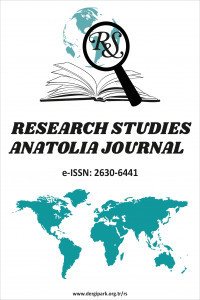YABANCI DİL DERSLERİNDE MOTİVASYON, ÖĞRENME STİLLERİ ve MEDYA KULLANIMI KONULARINDA AKILLI TAHTALARIN YERİ
Bu çalışmada Namık Kemal Üniversitesi Yabancı Diller Yüksekokulu'nda kullanılan akıllı tahtaların öğrencilerin öğrenme stilleri ve motivasyonlarına sağladığı katkıları tespit etmek hedeflenmiştir. Öğrencilere öğrenme stilleri, motivasyon ve medya kullanım becerilerini kapsayan çoktan seçmeli ve açık uçlu sorular yöneltilerek bu şekilde ders ortamlarını kendi bakış açılarından değerlendirmeleri istenmiştir. Anket SPSS Pasw Statistics 18.0 "Network" kullanılarak değerlendirilmiştir. Sonuç olarak öğrencilerin çoğunluğunun dil öğrenmede bir takım stratejiler kullandığı, fakat bunların etkililiği konusunda tam olarak farkındalık sahibi olmadıkları tespit edilmiştir. Ayrıca öğrenciler kendilerini dil öğrenme konusunda motive edecek unsurlardan birinin de sınıf içerisinde teknolojik yeniliklerden faydalanılması olduğunu belirtmişlerdir. Bunun yanında, dil öğreniminde yeniliklere açık bir tutum sergileseler de son tahlilde sınıf içerisinde pasif dinleyiciler olarak öğrenmeyi tercih ettiklerini vurgulamışlardır. Özellikle akıllı tahtanın ve diğer ders destek araçlarının tüm özellikleriyle bilinçli, etkili bir biçimde kullanılmasının, öğrencilerin yabancı dil derslerine karşı tutum ve başarılarını olumlu yönde etkileyeceği düşünülebilir. Bu araştırmanın sonuçları gösteriyor ki, ders ortamlarında faydalanılan teknolojik yenilikler, işlenen konulara ilgiyi yoğunlaştıracak ve öğrenmeyi daha eğlenceli ve motive edici hale getirecektir. Bu gibi yenilikler, gelecek derslerde öğrencinin derse katılımının yükselmesini sağlayıp, öğrenme isteğini ve güdüsünü büyük ölçüde artıracaktır. Böylece öğrencilerin dil öğrenmede kendi öğrenme stratejilerini belirlerken medya desteğinden faydalanmayı da göz ardı etmemeleri sağlanmış olacaktır.
Anahtar Kelimeler:
Akıllı Tahta, Motivasyon, Öğrenme Stilleri, Ders Ortamları, Medya Teknolojileri
The Place of Smart Boards in Foreign Language Lessons in the Matters of Motivation, Learning Strategies and Media Consumptions
The aim of this study is to investigate the benefits of using smart boards on students’ learning strategies and motivation at Namık Kemal University School of Foreign Languages. Students were asked multiple-choice and open-ended questions which included questions as to their learning styles, motivation, and media useage skills. In that way were asked to evaluate the learning environments from their own perspectives. Data were analyzed using SPSS PASW STATISTICS 18.0 "Network”. Reasults show that the majority of the students use some strategies in language learning, but they are not fully aware of their effectiveness. In addition, students state that one of the elements that motivate them to learn language is to benefit from technological innovations in the classroom. In addition to this, they emphasize that they prefer to learn as passive listeners in the classroom in the final analysis even though they exhibit an innovative attitude towards language learning. It can be thought that using smart boards and other course support tools in a conscious and effective way will affect the students' attitudes and successes towards foreign language lessons positively. The results of this study show that the technological innovations utilized in the classroom environment will intensify the interest in the subjects and make learning more fun and motivating. Such innovations will increase the student's participation in the course in future lessons and greatly increase the motivation and enthusiasm to learn. Thus, it will be ensured that students do not ignore the use of media support while determining their own learning strategies in language learning.
Keywords:
Smartboard, Motivation, Learning Styles, Classroom Environments, Mediatechnologies,
___
- BACHMANN, K. (2014). Integriertes Fertigkeitstraining im DaF-Unterrricht durch Einsatz interaktiver Web 2.0-Anwendungen und Apps, (Friedrich Schiller Universität, Philosophische Fakultät, Institut für Auslandsgermanistik / Deutsch als Fremd- und Zweitsprache, veröffentlichte Magisterarbeit), Jena.
- BREİTHECKER, D. (2002). Bewegte Schüler - Bewegte Köpfe. Unterricht in Bewegung. Chance einer Förderung der Lern- und Leistungsfähigkeit? Wiesbaden: Bundesarbeitsgemeinschaft für Haltungs- und Bewegungsförderung e. V.
- DÖRR, G., & STRİTTMATTER, P. (2002). Multimedia aus pädagogischer Sicht. In: L. J. Issing, & P. Klimsa, Information und Lernen mit Multimedia und Internet (s. 34). Weinheim: Beltz.
- FRİEDRİCH, K. (2012). Mobiles Lernen in der Schule: Das Handy als kulturelle Ressource für Bildungnutzen. In J. Lauffer, & R. Röllecke (Eds.), Dieter Baacke Preis Handbuch 7: Chancen digitaler Medien für Kinder und Jugendliche. München: Kopaed, ss. 53-58.
- GÖÇERLER, H. (2015). Effective Use of Smart Board and Smart Phones With Regards to Reading Studies in Foreign Language Courses. 10. International Balkan Congress on Education and Science: Education and Globalization (17-19 September,) (s. 181). Ohrid: BM-ABA-Strumica.
- GÖÇERLER, H. (2018). Die Effektivität der Smartphone-Applikationen auf die Wortschatzverfestigung und -erweiterung im Fremdsprachenunterricht, (Trakya ve Namık Kemal Üniversitesi, Sosyal Bilimler Enstitüsü, Ortak Doktora Programı, Yayınlanmamış Doktora Tezi), Edirne.
- ÖZEN, E. N., ALPARSLAN, İ. B., ÇAĞLI, A., ÖZDOĞAN, İ., SANCAK, M., DİZMAN, A. O., & SÖKMEN, A. (2014). Türkiye'deki Devlet Okullarında İngilizce Dilinin Öğretimine İlişkin Ulusal İhtiyaç Analizi. Ankara: British Council & tepav.
- SCHWERDTFEGER, I. C. (2002). Gruppenarbeit und innere Differenzierung Fernstudieneinheit 29. Kassel: Langenscheidt.
- TEKİN, Ö., & GÖÇERLER, H. (2016). Akıllı tahtaların Almanca hazırlık sınıflarında kelime öğrenimine etkileri üzerine deneysel bir çalışma örneği. International Journal of Human Sciences, 13(1), ss. 2040-2067. doi:10.14687/ijhs.v13i1.3761
- TİLBE, A., TOPALOĞLU, Y., TURĞUT, H., DİKMEN, F., ÖZAYDIN, H., & DÜNDAR, S. (2017). Akıllı Tahtaların Sözcük Öğrenimine Katkısı: Fransızca Hazırlık Sınıfları Örnekçesi. Border Crossing, 7(1), ss. 49-72.
- TU, T.H., Teacher-child verbal interactions in preschool science teaching, (Iowa State Üniversitesi, Yayınlanmış Doktora Tezi), Iowa 2001.
- TÜRKER, F. M. (2014). Yabancı Dil Eğitiminde Web Tabanlı Uzaktan Türkçe Öğretim Yöntemleri. Route Educational and Social Science Journal, 1(2), ss. 89-100.
- USLUEL, Y. K., & DEMİRASLAN, Y. (2005). Bilgi ve İletişim Teknolojilerinin Öğretme-Öğrenme Sürecine Entegrasyonunu İncelemede Bir Çerçeve: Etkinlik Kuramı. Hacettepe Üniversitesi Eğitim Fakültesi Dergisi, 28, ss. 134-142.
- YÜCEL, M., GÖÇERLER, H., & DEMIR, M. (2015). Interkulturelles Lernen durch den Whiteboardeinsatz als Zusatzmaterial. Humanitas Uluslararası Sosyal Bilimler Dergisi, 3(5), ss. 229-257.
- Yayın Aralığı: Yılda 4 Sayı
- Başlangıç: 2018
- Yayıncı: Arif YILDIZ
Sayıdaki Diğer Makaleler
ÇOK KADEMELİ BİR TEDARİK ZİNCİRİ AĞI İÇİN ÜRETİM-DAĞITIM VE TERSİNE LOJİSTİK PLANLAMASI
TÜRKİYE’DE YENİLENEBİLİR ENERJİ POTANSİYELİ, ÜRETİMİ, TÜKETİMİ ve CARİ İŞLEMLER DENGESİ İLİŞKİSİ
Harun GÖÇERLER, Şahbender ÇORAKLI
20.YY YAHUDİ DÜŞÜNCESİNE BİR KATKI: LOUIS JACOBS (1920-2006)
ÜNİVERSİTE ÖĞRENCİLERİNİN SOSYAL MEDYADA İÇERİK ÜRETİMİ ÜZERİNE BİR ÇALIŞMA
OKUL YÖNETİCİSİNİN YETERLİKLERİ ÖLÇEĞİ GELİŞTİRME ÇALIŞMASI
KRİPTO PARALARIN DÜNYA VE TÜRKİYE’DEKİ GÜNCEL DURUMU ÜZERİNE BİR İNCELEME
TÜRKİYE’ DE SİVİL TOPLUM KURULUŞLARININ İŞLEVLERİ VE SORUN ALANLARI
